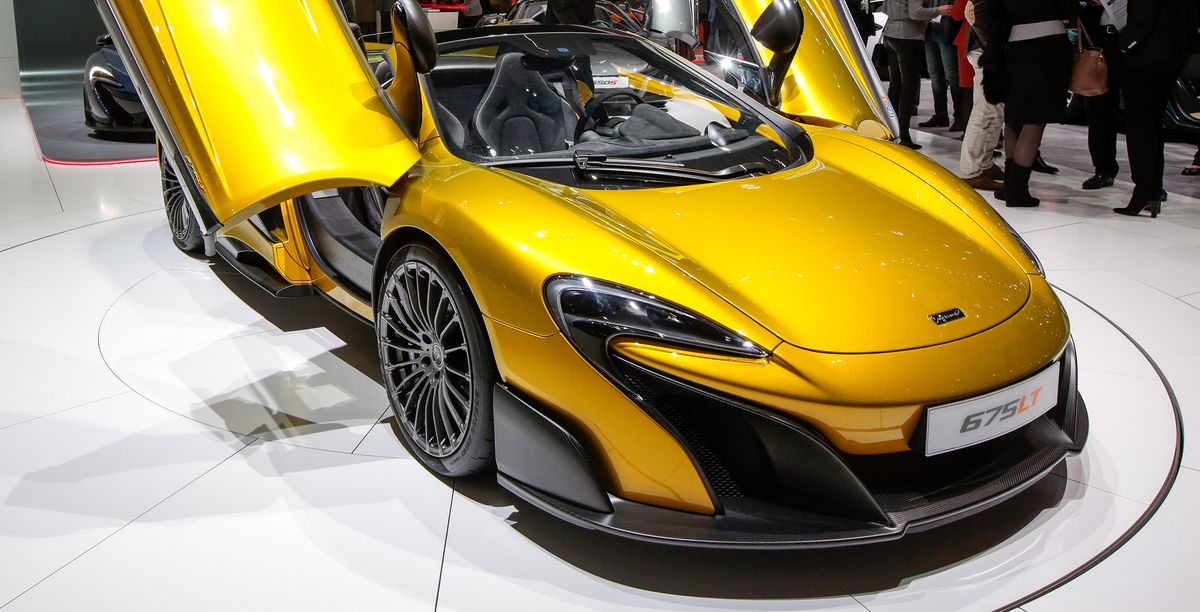Apple-Target McLaren Is a Tech Company Disguised as a Carmaker
On the face of it, U.K. supercar maker McLaren would seem an odd partner for Apple Inc. as the consumer electronics and software giant seeks to crack the global auto industry. Yet McLaren’s rich history in Formula One means the company has as much in common with Apple as it does with more-conventional carmakers.
September 22, 2016

(Bloomberg) -- On the face of it, U.K. supercar maker McLaren would seem an odd partner for Apple Inc. as the consumer electronics and software giant seeks to crack the global auto industry.
With its racetrack heritage and gas-guzzling models priced from 126,000 pounds ($165,000), Woking, England-based McLaren is a world away from the mainstream auto market, which Apple appears to be targeting and where it would face brands with a global profile to match its own.
Yet McLaren’s rich history in Formula One, the most elite level of auto racing, means the company has as much in common with Apple as it does with more-conventional carmakers such as Ford Motor Co. and General Motors Co. Formula One is a technology-led circuit in which engines and chassis are highly regulated and minute electronic enhancements can make the difference between winning and finishing last.
McLaren has also achieved the transition from developer of industry-leading technology to a full-scale producer of street-legal cars in just six years, presenting a blueprint for making a splash in the auto market in short order. Apple is exploring a strategic investment with the carmaker, people familiar with the matter said, though both parties denied that talks are under way.
“Getting into McLaren would give Apple engineering and carmaking competency at the pointy end,” said Ferdinand Dudenhoeffer, director of the Center for Automotive Research at the University of Duisburg-Essen. “This is about gaining research and development knowledge, not about about buying a carmaker with mass-production capabilities.”
TECHNICAL ADVANCES
McLaren was established by New Zealand-born race driver and car designer Bruce McLaren in 1963 and first competed in the Formula One world championship three years later. It ranks second only to Ferrari in the number of drivers’ titles won.
While the first decades of F1 were notable for buccaneering drivers such as Juan Manuel Fangio and Stirling Moss, the sport gradually came to be dominated by technical advances as its organizers introduced a host of performance and engineering limitations to help level the field.
The curbs pushed teams to innovate to eke out incremental improvements and develop systems not yet limited by the governing body. McLaren was first to use carbon-fiber composites in its cars, developed an air-flow system that exploited a loophole in the rules to deliver a 6 mile-per-hour speed advantage and in 2009 won the first race using hybrid technology that stores up energy from braking to deliver a sudden burst of power.
LAB COATS
The two companies also share a design ethos, with architects Foster + Partners Ltd. creating Apple’s “ spaceship” headquarters in Cupertino, California and the McLaren Technology Centre in Woking. The heart of the auto company’s operations features a glass-fronted building that combines with an artificial lake to form a yin-yang shape. Next door stands the McLaren Automotive production center, where staff members wear white coats and clutter is banned.
The 50 million-pound factory opened in 2011, two years after McLaren Chairman Ron Dennis announced that the race team planned to start manufacturing cars for the public. It had dipped a toe in the water in the 1990s with the McLaren F1 model, of which only about 100 were built.
Sales of the company’s 200-mile-per-hour autos increased for a fifth straight year in 2015, prompting it to expand the engineering workforce by 40 percent and to target production of 4,000 cars annually as early as 2017. Italian sports-car maker Ferrari NV plans to build about 8,000 vehicles next year.
PROJECT TITAN
Apple already has hundreds of car engineers in a special projects group called Project Titan. The auto team includes three main groups: one focused on software, another on self-driving sensors and a third on mechanical hardware. The approach gives it the option of marketing any platform technology it creates to carmakers or selling its own automobiles.
Closely held McLaren is more than 55 percent owned by Bahrain Mumtalakat Holding Co., the investment arm of the kingdom of Bahrain. The next two biggest shareholders are TAG Group Ltd., a Luxembourg-based holding company, with 11 percent, and Dennis, who owns 10 percent and is still regarded as a key figure, having run the race team in its heyday. McLaren is valued at 750 million to 1 billion pounds, according to Richard Hilgert, a Chicago-based analyst with Morningstar.
Analysts at Evercore ISI said Thursday in a note that Apple may just be targeting the McLaren Technology racing arm -- led by Dennis -- which would be attractive for its experience in predictive data analytics, simulation, advanced manufacturing and electronic components.
Dennis, as “the driver behind McLaren,” is likely to be part of the attraction, Dudenhoeffer said. “He’s always had the drive and passion to pursue goals that are difficult to get to, so from that perspective it would be a good fit with Apple too.”
About the Author
You May Also Like






.jpg?width=700&auto=webp&quality=80&disable=upscale)
